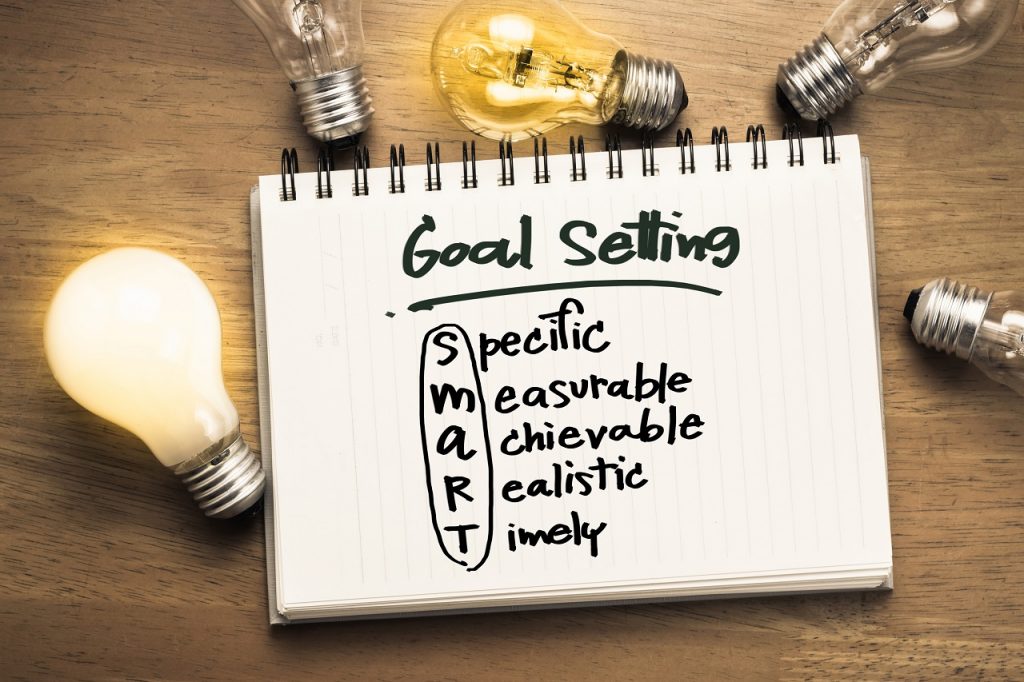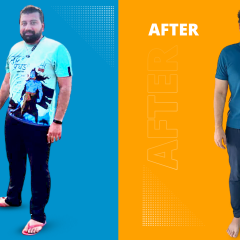 As a lifestyle coach, I often hear people complain about how they have been working on their health goals, but not getting anywhere. Most times, they aren’t able to achieve that “perfect target” is because they are either confused about the target they want to set or don’t know how to plan a strategy to achieve that goal. The simple solution is to plan SMART goals.
As a lifestyle coach, I often hear people complain about how they have been working on their health goals, but not getting anywhere. Most times, they aren’t able to achieve that “perfect target” is because they are either confused about the target they want to set or don’t know how to plan a strategy to achieve that goal. The simple solution is to plan SMART goals.
What are SMART Goals?
SMART is an acronym which was first used by George Doran in a Management Review Magazine in 1981. It gained popularity not just in companies but, also in other relevant fields including health and fitness.
SMART stands for:
- Specific
- Measurable
- Achievable
- Realistic
- Time bound
In essence, a SMART goal is a simple formula which helps you define your goal clearly, focus your efforts, and utilize your time and resources productively to increase your chances of achieving a particular goal successfully.
How Do We Achieve It?
1. Specific
Your goal should be clear and specific! It is crucial to focus your effort towards one point and feel truly motivated to achieve it. When planning the goal, ask the five “W” questions, namely:
- What do I want to accomplish?
- Why is it important to me?
- When do I want to achieve this goal?
- How will I achieve this goal?
- Which resources will help me in achieving them?
For example, a general goal would be ‘I want to get a toned body’. While a SMART goal would be ‘I want to join a Zumba class near my house and I will go there 4 days a week to improve flexibility and muscle strength’.
2. Measurable
It is important to measure your goals in order to track your progress regularly and feel motivated. Assessing your progress with specific indicators at regular intervals helps you stay focused and feel the thrill of getting closer to your goals. In fact, it even helps you change your strategy if needed. To make a goal measurable, ask:
- How many/much?
- How will I know when it is accomplished?
- What is the indicator of my progress?
For example, building on a specific goal, we will add, ‘I will join the Zumba class near my house for 4 days a week to improve flexibility and muscle strength. I will aim to lose 1kg of body fat weight every 15 days’.
3. Achievable
Ensure that your goal is achievable. While it should stretch your abilities enough to make you feel challenged, it should also be possible to achieve. An achievable goal should answer the following questions:
- How can I achieve it?
- Do I have the proper resources and capabilities to achieve the goal? If not, what am I missing?
- Is the goal approved by experts in that field?
For example, setting a goal of reducing 4-5kg weight in one month may not be achievable and neither advisable by health professionals because of its harmful effects on the body. It can also demotivate you if you don’t achieve that goal.
4. Realistic
Keep your goals realistic! It should be practically achievable, given the resources and time available to you! A realistic goal should fulfil the following criteria:
- Is the goal realistic and within reach?
- Is the goal reachable given the time and resources?
- Am I able to commit to achieving the goal?
For example, setting a specific goal of attending Zumba classes seven days a week may not be realistic if you have other commitments towards your family or professional life!
5. Time-Bound
Your goal should also have a specific deadline. This is to ensure that you have a well-defined duration to work towards it. Making your goal time-bound can also prevent the goal from slipping down your priority list.
A time-bound goal should answer the following questions:
- When?
- What can I achieve from six months now?
- What can I achieve from six weeks now?
- What can I achieve today?
For example, building on our goal above: ‘I will join a Zumba class from October 1 near my home. In order to improve muscle flexibility and strength, I will workout 4 days a week. Every 15 days I will target 1kg weight loss! By the end of October, I will have realised my goal if I lose 2kg of fat weight over the course of the month’.
As Bill Copeland has quoted, ”The trouble with not having a goal is that you can spend your life running up and down the field and never score!” So choose your goals SMARTly and get set to hit the bull’s eye!
What are some of your long-term and short-term health and fitness goals? Are they smart goals? Let us know in the comments below!
For more on goal setting and healthy living, check out Healthy Reads. To get started on your resolutions, sign up for GOQii’s Personalised Health Coaching and let our experts guide and motivate you!
#BeTheForce

 If you’ve been looking at motivational posters on social media or your local gyms which have “go hard or go home” or “work until your muscles hurt” or “no gain without pain” or something to the effect of relating success to extreme weight training, then you’ve clearly been looking at the wrong posters. We come over so many cases where users claim that they’ve been at it in the gym for so long without ever achieving their desired result. In order to help you avoid the same fate, we’re sharing this article on muscle building mistakes!
If you’ve been looking at motivational posters on social media or your local gyms which have “go hard or go home” or “work until your muscles hurt” or “no gain without pain” or something to the effect of relating success to extreme weight training, then you’ve clearly been looking at the wrong posters. We come over so many cases where users claim that they’ve been at it in the gym for so long without ever achieving their desired result. In order to help you avoid the same fate, we’re sharing this article on muscle building mistakes!



